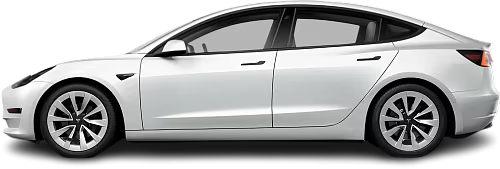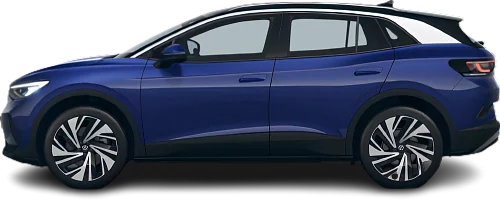Global EV Comparison: Tesla Model 3 Standard Range vs Volkswagen ID.4 1st Edition
Struggling to Decide? Let AI Help!
Your AI Summary Is Ready!
General Info
Since both vehicles have been discontinued, they are now only available on the used car market. You can get the Tesla Model 3 Standard Range (2019-2020) for as low as €18790, while the Volkswagen ID.4 1st Edition (2020-2021) begins at €25930.
The Tesla Model 3 Standard Range (2019-2020) is a Sedan, whereas the Volkswagen ID.4 1st Edition (2020-2021) is a SUV.
| Property | Tesla Model 3 Standard Range | Volkswagen ID.4 1st Edition |
|---|---|---|
| Years of Production | 2019-2020 | 2020-2021 |
| Current Status | Discontinued | Discontinued |
| Country of Manufacture | China, Germany, USA | Germany |
| Body Style | Sedan | SUV |
| Market Availability | EU, USA | EU, USA |
| Price Europe (Used) | €18790 | €25930 |
| GCC Score | 6.1 | 6.2 |
Range and Efficiency
While the Volkswagen ID.4 1st Edition (2020-2021) offers a longer real-world range and a bigger battery, it is less energy-efficient than the Tesla Model 3 Standard Range (2019-2020).
| Property | Tesla Model 3 Standard Range | Volkswagen ID.4 1st Edition |
|---|---|---|
| Range (EPA) | 354 km | 402 km |
| Range (WLTP) | - Range (WLTP) | 501 km |
| Range (GCC) | 336 km | 417 km |
| Battery Capacity (Nominal) | 60 kWh | 82 kWh |
| Battery Capacity (Usable) | 57.5 kWh | 77 kWh |
| Efficiency per 100 km | 17.1 kWh/100 km | 18.5 kWh/100 km |
| Efficiency per kWh | 5.84 km/kWh | 5.42 km/kWh |
| Range and Efficiency Score | 6.2 | 6.8 |
Charging
Both vehicles utilize a standard 400-volt architecture.
The Tesla Model 3 Standard Range (2019-2020) offers faster charging speeds at DC stations, reaching up to 170 kW, while the Volkswagen ID.4 1st Edition (2020-2021) maxes out at 125 kW.
Both vehicles are equipped with the same on-board charger, supporting a maximum AC charging power of 11 kW.
| Property | Tesla Model 3 Standard Range | Volkswagen ID.4 1st Edition |
|---|---|---|
| Max Charging Power (AC) | 11 kW | 11 kW |
| Max Charging Power (DC) | 170 kW | 125 kW |
| Architecture | 400 V | 400 V |
| Charge Port | CCS Type 2 (Tesla) | CCS Type 2 |
| Charging Score | 5.7 | 6.2 |
Performance
Both vehicles are rear-wheel drive.
The Tesla Model 3 Standard Range (2019-2020) boasts greater motor power and accelerates faster from 0 to 100 km/h.
| Property | Tesla Model 3 Standard Range | Volkswagen ID.4 1st Edition |
|---|---|---|
| Drive Type | RWD | RWD |
| Motor Type | PMSM | PMSM |
| Motor Power (kW) | 208 kW | 150 kW |
| Motor Power (hp) | 279 hp | 201 hp |
| Motor Torque | 420 Nm | 310 Nm |
| 0-100 km/h | 6.1 s | 8.5 s |
| Top Speed | 225 km/h | 160 km/h |
| Performance Score | 5 | 3.3 |
Dimensions
The Tesla Model 3 Standard Range (2019-2020) has a longer body, while the Volkswagen ID.4 1st Edition (2020-2021) stands taller, offering a more elevated ride. Their widths are almost identical, so both offer a similar amount of shoulder room.
The Tesla Model 3 Standard Range (2019-2020) boasts a more extended wheelbase.
| Property | Tesla Model 3 Standard Range | Volkswagen ID.4 1st Edition |
|---|---|---|
| Length | 4695 mm | 4584 mm |
| Width (with Mirrors) | 2088 mm | 2108 mm |
| Width (w/o Mirrors) | 1850 mm | 1852 mm |
| Height | 1445 mm | 1620 mm |
| Wheelbase | 2875 mm | 2765 mm |
Cargo and Towing
The Tesla Model 3 Standard Range (2019-2020) features a larger trunk, but the Volkswagen ID.4 1st Edition (2020-2021) offers greater maximum cargo capacity when the rear seats are folded.
A frunk (front trunk) is available in the Tesla Model 3 Standard Range (2019-2020), but the Volkswagen ID.4 1st Edition (2020-2021) doesn’t have one.
When it comes to towing, both cars offer identical towing capacity (up to 1000 kg).
| Property | Tesla Model 3 Standard Range | Volkswagen ID.4 1st Edition |
|---|---|---|
| Number of Seats | 5 | 5 |
| Curb Weight | 1611 kg | 2119 kg |
| Cargo Volume (Trunk) | 561 l | 543 l |
| Cargo Volume (Max) | 1235 l | 1575 l |
| Cargo Volume (Frunk) | 88 l | - Cargo Volume (Frunk) |
| Towing Capacity | 1000 kg | 1000 kg |
| Cargo and Towing Score | 5.1 | 6.7 |




